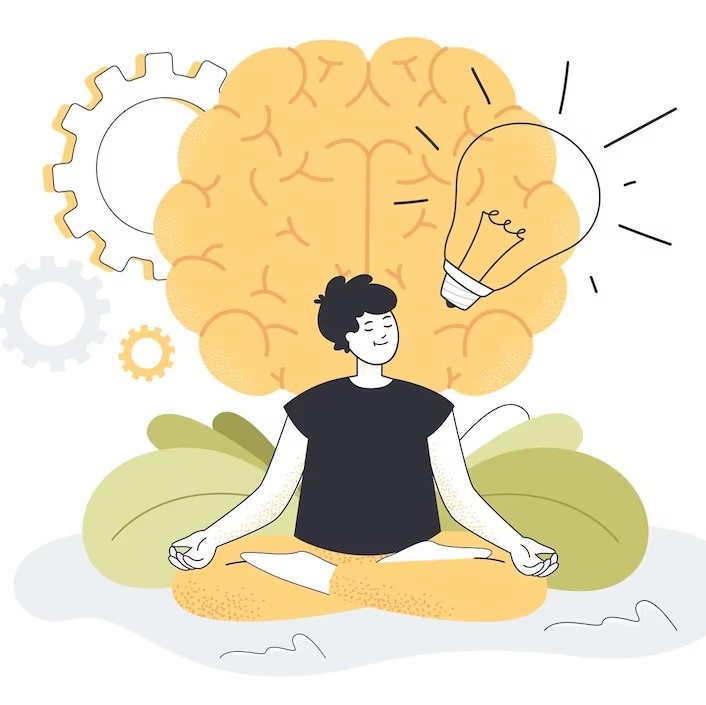Overcoming Limiting Beliefs About Yourself
Overcoming Limiting Beliefs About Yourself
Limiting beliefs are those beliefs we hold about ourselves that constrain us in some way. They can be negative beliefs about our abilities, our character, or even our potential. These beliefs can hold us back from reaching our full potential, achieving our goals and living the life we truly desire. They are based on past experiences or external factors that we have internalized and made a part of our core beliefs about ourselves.
One way to overcome limiting beliefs is to identify them and challenge them. This involves taking a critical look at the beliefs we hold and dismantling them one by one. For example, if you have a belief that you are not good enough to start a business, challenge that belief by looking at successful business owners who may have had similar doubts about themselves. You can also seek out evidence that contradicts your belief, such as positive feedback from others or past accomplishments.
Another effective way to overcome limiting beliefs is to shift your focus from what you can't do to what you can do. This involves identifying your strengths and skills and using them to your advantage. By focusing on your abilities, you can increase your confidence and self-esteem, which can help you overcome self-doubt and negative beliefs. It's important to remember that everyone has strengths and weaknesses, and by embracing your strengths, you can work towards your goals with more clarity and purpose.
Understanding the Power of Your Thoughts
Your thoughts have immense power to shape your life. Everything you experience and achieve in life starts with a thought. If you want to change your life, you first have to change your thoughts. Your thoughts can create a positive or negative reality, and it is up to you to decide what kind of reality you want to create. You must learn to control your thoughts and direct them towards your desired outcomes. Every thought you think is like a seed that you plant in the garden of your mind. If you cultivate positive thoughts, you will reap positive results in your life.
Negative thoughts can create a vicious cycle of self-sabotage and failure. If you constantly think negative thoughts, you will attract negative situations and negative people into your life. You will also become your own worst enemy, undermining your potential and limiting your success. Negative thoughts can lead to stress, anxiety, and depression. They can affect your physical health, your relationships, and your overall well-being.
On the other hand, positive thoughts can lead to a life of success, happiness, and abundance. Positive thoughts can create a powerful chain reaction of good things happening to you. When you focus on positivity, you attract positive situations and positive people into your life. You also become more confident, more motivated, and more resilient. Positive thoughts can improve your health, your relationships, and your overall quality of life. By mastering your thoughts, you can transform your life and achieve your dreams.
Developing Self-Awareness of Your Beliefs
Developing self-awareness of your beliefs is an essential step towards understanding yourself better. In today's fast-paced world, it is easy to lose track of our convictions and adopt beliefs without giving them a second thought. However, without knowing what we stand for, it is challenging to live a meaningful life. Building self-awareness requires taking the time to reflect on our values, exploring our past experiences and the underlying assumptions that shape our worldview.
One of the best ways to develop self-awareness is through journaling. Writing down our thoughts and beliefs can help us uncover patterns and reflect on why we think the way we do. It can also help us identify any inconsistencies or contradictions that may exist in our beliefs. Another strategy is to seek out different perspectives and engage in respectful conversations with people who have different beliefs than our own. By doing so, we can challenge our assumptions and gain a better understanding of our own worldview.
As we dive deeper into our beliefs, it is important to approach the process with openness and curiosity. We should avoid being defensive or judgmental, as this can hinder our ability to learn and grow. Instead, we should strive to be mindful of our thoughts and feelings, and be willing to question our own beliefs. Developing self-awareness of our beliefs is an ongoing process that requires patience and practice. However, by doing so, we can gain a stronger sense of self and live more authentically in a complex and ever-changing world.
Uncovering Your Core Beliefs
Uncovering your core beliefs is a critical aspect of personal growth and self-discovery. These deep-seated beliefs are the guiding principles and perspectives that shape our thoughts, decisions, and behaviors. By understanding and delving into them, we can gain clarity and insight into our underlying motivations, fears, and aspirations. Identifying and challenging negative or limiting beliefs allows us to overcome ingrained patterns of thinking and elevate our sense of purpose and fulfillment.
The process of uncovering core beliefs requires self-reflection, introspection, and a willingness to explore uncomfortable feelings and experiences. We must be honest with ourselves and confront any biases or assumptions we hold. It can be helpful to journal our thoughts and feelings to gain perspective and identify recurring themes or patterns. Seeking guidance from a therapist or support group can also be beneficial in this journey of self-discovery.
Ultimately, uncovering our core beliefs empowers us to live authentically and aligned with our values. It allows us to break free from the limitations of past experiences or societal conditioning and to create a future that is truly our own. By understanding our beliefs, we can make intentional choices that lead to a more fulfilling and purposeful life. It may be a challenging and uncomfortable process, but the journey towards self-discovery is one of the most rewarding experiences we can undertake.
Understanding the Origin of Negative Beliefs
Negative beliefs are deeply ingrained within us by our life experiences, cultural upbringing, and personal perspectives. These beliefs can range from feeling inadequate or unworthy of love and affection to thinking that we are incapable of achieving success and happiness. They are often the result of various forms of rejection, abuse, or trauma, which can generate feelings of fear, shame, and guilt that become internalized and shape our worldview. For instance, if someone has been bullied in school, they may develop a belief that they are not good enough, and this can carry on into adulthood and impact their personal and professional growth.
Understanding the origin of our negative beliefs is crucial to overcoming them and living a positive and fulfilling life. It requires self-awareness and reflection on our thoughts and behaviors, as well as the willingness to challenge our assumptions and reframe our beliefs. Moreover, it involves acknowledging that these beliefs are not fixed, but rather, they are subject to change and transformation through therapy, mindfulness, and other forms of personal development. By recognizing the factors that have contributed to our negative beliefs and questioning their validity, we can begin to unravel their hold on us and replace them with positive and empowering beliefs.
Negative beliefs can have a profound impact on our mental and physical well-being, as well as our relationships and social interactions. They can lead to depression, anxiety, and other mental health issues, as well as contribute to self-doubt, low self-esteem, and perfectionism. In addition, they can create a self-fulfilling prophecy in which we act in ways that reinforce our negative beliefs and limit our potential. For example, if someone believes that they are not smart enough to pursue higher education, they may self-sabotage their academic endeavors and miss out on opportunities for personal growth and career advancement. Therefore, it is essential to recognize and challenge our negative beliefs to prevent them from hindering our well-being and success.
Challenging Unhelpful Thinking Styles
Unhelpful thinking styles are negative patterns of thinking that often cause distress, anxiety, and depression. These thoughts are often automatic and can be difficult to change. Examples of unhelpful thinking styles include catastrophizing, jumping to conclusions, black and white thinking, and personalization. To challenge these patterns of thinking, it is important to recognize them when they occur and to consciously replace them with more positive and realistic thoughts.
To challenge unhelpful thinking styles, it is important to examine the evidence for and against the negative thoughts. Ask yourself, is there any evidence to support this thought? Is there any evidence that contradicts this thought? It can be helpful to write down the evidence so that it is easier to see the facts objectively. It is also important to ask yourself, what is the worst that could happen? Often, our catastrophic thoughts are not based in reality, and this exercise can help to bring things back into perspective.
Another way to challenge unhelpful thinking styles is to consider alternative explanations for the situation. Is there another possible explanation for what is happening? Are there other factors at play that you may not be considering? It can also be helpful to consider how someone else might view the situation. Would they interpret it in the same way or would they have a different perspective? Sometimes, simply seeing the situation from a different angle can help to challenge the negative thoughts and provide a more balanced view.
Recognizing Triggering Events and Belief Reinstatement
Recognizing triggering events can help individuals identify situations that may cause negative thoughts or beliefs to resurface. These triggering events could be anything from hearing a certain song to engaging in a particular activity. Once the individual recognizes the triggering event, they can then take steps to avoid or manage it. Additionally, recognizing the triggering event can provide insight into the root cause of the individual's negative thoughts or beliefs.
Belief reinstatement is a cognitive-behavioral technique that involves identifying and challenging negative thoughts and beliefs. This technique requires individuals to question the validity of their negative thoughts and beliefs and consider more positive, realistic alternatives. Belief reinstatement can be particularly useful in overcoming anxiety and depression, as it helps individuals reframe their negative beliefs and see the situation from a more balanced perspective. Over time, the individual can develop a more positive outlook and improve their overall mental health.
Recognizing triggering events and practicing belief reinstatement can be key components of cognitive-behavioral therapy, a treatment approach often used to address a variety of mental health concerns. By identifying and challenging negative thoughts and beliefs, individuals can learn to manage their emotions and improve their overall quality of life. While it can take time and effort to master these techniques, the benefits can be significant and long-lasting. With the help of a qualified mental health professional, individuals can learn to harness the power of their thoughts and beliefs and create a healthier, happier life for themselves.
Increasing Your Self-Confidence
One of the most important factors in increasing your self-confidence is to recognize your strengths and weaknesses. Take some time to work on your self-awareness and identify the areas where you excel and the areas where you could improve. This will help you build confidence in your abilities and give you a clear understanding of where you need to focus your efforts.
Another key to building self-confidence is to set achievable goals for yourself. Start with smaller goals and work your way up to larger ones. By accomplishing smaller goals, you will begin to build momentum and see progress towards your larger goals. This will help you develop confidence in your ability to achieve what you set out to do.
Finally, it is important to focus on positive self-talk and surround yourself with supportive people. Instead of beating yourself up for mistakes or failures, acknowledge them as opportunities to learn and grow. Look for the good in yourself and others, and cultivate relationships with those who lift you up and encourage you to be your best self. By taking these steps, you can increase your self-confidence and achieve your goals with greater ease and success.
Appreciating Your Strengths and Talents
Recognizing and appreciating your strengths and talents is a key aspect of personal growth and development. Your strengths are the unique qualities that make you who you are and enable you to excel at certain tasks or activities. These can include a wide range of attributes such as creativity, leadership, organization, communication skills or a talent in a particular area, like music or athletics. By acknowledging your strengths, you can build on them and capitalize on your abilities to achieve your goals.
It can be easy to focus on our weaknesses and areas we need to improve on, and overlook our strengths. But taking the time to appreciate your talents and strengths can give you a greater sense of self-awareness and confidence. When we know what we're good at, we can use those skills to our advantage and feel more fulfilled and successful in our personal and professional lives. Recognizing and celebrating our strengths can also help us maintain a positive mindset and outlook on life.
There are many ways to appreciate your strengths and talents. One approach is to take an inventory of your skills and accomplishments. Make a list of your top strengths, and reflect on how these qualities have helped you in different situations. Another approach is to seek feedback from others. Ask your friends, family or colleagues what they think your strengths are, and how you can use these talents to achieve your goals. Once you have a better understanding of your strengths, you can develop an action plan to maximize your potential and achieve your goals.
Creating a Positive Self-Image
Creating a positive self-image is crucial for leading a fulfilling and happy life. When you have confidence in yourself, it shows in the way you carry yourself, interact with others, and approach challenges. However, building a positive self-image takes time and effort, but the payoff is immeasurable.
One way to start building a positive self-image is to focus on your strengths and accomplishments. Instead of dwelling on your weaknesses and failures, shift your attention to what you do well and the things you've achieved. Make a list of your strengths and refer to it often. This will help you build confidence in yourself and recognize your self-worth.
Another way to improve your self-image is to practice self-care. Taking care of yourself mentally and physically can help boost your confidence and overall sense of well-being. This can include getting enough sleep, eating a balanced diet, exercising regularly, and taking time for activities that bring you joy and relaxation. When you prioritize your self-care, you are sending a message that you value and respect yourself.
Positive Self-Talk
Positive self-talk is a powerful tool that can significantly impact a person's well-being and overall mindset. It involves intentionally using affirmative and encouraging language when speaking to oneself. This kind of dialogue works to build a sense of self-compassion that ultimately leads to a more positive outlook on life. Individuals who practice positive self-talk report increased self-esteem, better problem-solving skills, and improved overall mood.
One of the primary benefits of positive self-talk is its ability to reduce stress and anxiety. When someone is feeling overwhelmed or anxious, they may experience negative self-talk, which only serves to worsen their mood. However, by replacing negative thoughts with more positive ones, individuals can effectively combat feelings of stress and anxiety. Positive self-talk can even help people overcome trauma and other emotional challenges, as it provides a sense of self-love and acceptance.
Practicing positive self-talk involves replacing negative or critical thoughts with affirmations that reinforce positive beliefs and values. For example, instead of telling oneself, 'I'm never going to be good enough,' a more positive alternative might be, 'I am capable and competent, and I will achieve my goals.' It takes effort and practice to get in the habit of using positive self-talk, but the benefits are well worth it. By regularly utilizing positive and supportive dialogue with oneself, individuals can cultivate a greater sense of self-love and confidence that brings joy and success to their lives.
Rewriting Your Mindset
Your mindset is a product of the thoughts and beliefs that you have developed over time. These thoughts and beliefs shape your attitudes, behaviors, and actions. A mindset can be either positive or negative. A positive mindset encourages growth and development, while a negative mindset can hinder progress and success. However, the good news is that your mindset is not fixed. It can be changed, and that change can lead to a better life.
To rewrite your mindset, you must first identify the negative thoughts and beliefs that are holding you back. This can be done by analyzing your past experiences, identifying patterns of behavior that are causing problems, and recognizing when negative self-talk is occurring. Once you have identified these negative patterns, you need to replace them with positive ones. This is not an easy task and requires a commitment to change. However, the more you practice positive self-talk and focus on the positive aspects of life, the easier it will become.
One way to help rewrite your mindset is to surround yourself with positivity. This can be achieved by spending time with people who have a positive mindset, reading positive affirmations and self-help books, and listening to motivational podcasts. By immersing yourself in positivity, you are more likely to adopt a positive mindset and way of thinking. Finally, it is important to remember that changing your mindset is not an overnight process. It takes time, effort, and dedication. However, by making a commitment to rewiring your thought patterns, you can start to live a more fulfilling and successful life.
Making Your Beliefs Work for You
Your beliefs are the guiding principles that shape your entire life. They influence every decision you make, from the way you think to the actions you take. Beliefs can help you achieve your dreams or hold you back, depending on how you view them. To make your beliefs work for you, it is important to examine them closely and determine whether they are serving you well or hindering your progress.
One way to have your beliefs work for you is to create a positive mindset. Positive beliefs lead to positive outcomes, whereas negative beliefs lead to negative outcomes. If you believe that success is possible and that you have the skills to achieve it, you are more likely to take the necessary steps to make it happen. Conversely, if you believe that success is impossible and that you lack the skills to achieve it, you are less likely to even try.
Another important aspect of making your beliefs work for you is to align them with your goals. If your beliefs are not in line with your goals, you are likely to encounter roadblocks and obstacles that will prevent you from achieving what you want. This is because your beliefs will dictate your actions, and if your actions are not aligned with your goals, you will struggle to make progress. Therefore, it is important to identify your goals and ensure that your beliefs are in line with them, so that you can achieve them with ease.



